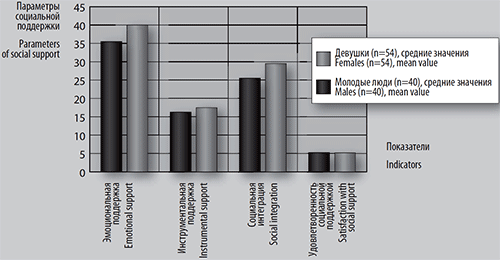Article
Lifintsev D.V., Serykh A.B., Lifintseva A.A. (2017). Tolerance to uncertainty in the context of social support: gender specificity in the youth environment. National Psychological Journal. 2, 98-105.
Abstract
The paper presents the results of a study of social support for young males and females, and also its relationship with tolerance of uncertainty. A series of psychodiagnostic tools were used to study gender determinants of social support, tolerance of uncertainty and interpersonal intolerance in young people with different levels of emotional and instrumental support. Young males and females aged 18–22 years with a high level of tolerance of uncertainty are susceptible to various forms of social support. The ability to accept uncertainty, to function in the system of unclear interpersonal communication and to act in the face of changing circumstances determine the level of satisfaction with social support in the participants. The research (N=165) confirmed the assumption that first and foremost social support as a communicative phenomenon has differences in the perception of emotional forms in young males and females. Secondly, the specific features of person functioning in the social supporting act system are interrelated, including the level of tolerance of uncertainty. Thirdly, social support can reduce human state of uncertainty and eventually neutralize the negative impact of stressful events. The human ability to «see and discover» the social support, be sensitive and attentive to the supporting acts of social environment has a close relationship with the ability to accept uncertainty and maintain stability in a state of discomfort if any.
Accepted: 01/14/2017
Pages: 98-105
DOI: 10.11621/npj.2017.0211
PDF: Download
Keywords: social support; social integration; tolerance; tolerance to ambiguity; young people;
Available Online 28.06.2017

Fig. 1. Mean values based on F-SOZU-22 method
Table 1. Mean values of social support in the participants with different levels of tolerance of uncertainty (in points)
|
Tolerance of Uncertainty. Forms and Levels |
Parameters of Social Support (mean value) |
|||
|
Emotional Support |
Tool Support |
Social Integration |
Satisfaction with Social Support |
|
|
Tolerance of Uncertainty (ТU) |
||||
|
High Level |
38.89 |
17.63 |
28.88 |
5.35 |
|
Average Level |
35.31 |
16.43 |
25.84 |
5.56 |
|
Low Level |
34.63 |
14.67 |
20.2 |
5.41 |
|
Intolerance (IT) |
||||
|
High Level |
39.10 |
17.74 |
27.71 |
4.93 |
|
Average Level |
36.78 |
16.83 |
27.43 |
5.71 |
|
Low Level |
26.77 |
13.77 |
21.66 |
6.02 |
|
Interpersonal Intolerance to Uncertainty (IITT) |
||||
|
High Level |
37.93 |
17.61 |
26.25 |
4.46 |
|
Average Level |
37.23 |
16.91 |
27.89 |
5.79 |
|
Low Level |
33.31 |
15.62 |
25.75 |
6.25 |
References:
Albrecht, T.L., & Adelman, M.B. Communicating social support. Newbury Park, CA: Sage, 1987.
Barbee, A. P., Cunningham, M. R., Winstead, B. A., Derlega, V. J., Gulley, M. R., & Yankeelov, P. A. et al. (1993) Effects of gender role expectations on the social support process. Journal of Social Issues. 49,175–190. doi: 10.1111/j.1540-4560.1993.tb01175.x
Bardier, G. (2005) Complex methods of researching tolerance. [Pochebut L.G. Vzaimoponimanie kul’tur]. SPb., Izdatel’stvo S-Peturburgskogo Universiteta. 278, 239–277.
Brashers, D.E., Neidig, J.L., Russell, J.A., Cardillo, L.W., Haas, S.M., & Dobbs, L.K., et al. (2003) The medical, personal, and social causes of uncertainty in HIV illness. Issues in Mental Health Nursing. 24, 497–522. doi: 10.1080/01612840305292
Cumsille, P.E., & Epstein, N. (1994) Family cohesion, family adaptability, social support, and adolescent depression symptoms in outpatient clinic families. Journal of Family Psychology. 8(2), 202–214. doi: 10.1037/0893-3200.8.2.202
Doumit, R. (2012) Coping Mechanisms Among Lebanese First-Time College Students. Dissertations. Loyola University Chicago, 346.
Grenier, S., Barrette, A-M., & Ladouceur, R. (2005) Intolerance of Uncertainty and Intolerance of Ambiguity: Similarities and differences. Personality and Individual Differences. 39, 593–600. doi: 10.1016/j.paid.2005.02.014
Harber, K.D., Kennedy, K.A., Jussim, L., Freyberg, R., & Baum, L. (2008) Social support opinions. Journal of Applied Social Psychology. 38(6), 1463– 1505. doi: 10.1111/j.1559-1816.2008.00356.x
Kholmogorova, A.B., & Petrova, G.A. (2007) Methods of diagnosing social support for affective spectrum disorders. [Meditsinskaya tekhnologiya. MNII psikhiatrii Roszdrava]. Moscow, 24.
Kornilova, T.V. (2010) The new tolerance of uncertainty questionnaire. [Psikhologicaheskiy zhurnal]. 31, 74–86.
Kornilova, T.V. (2003) The psychology of risk and decision-making. Moscow, Aspekt Press.
Kornilova, T.V., & Chumakova, M.A. (2014) The scales of tolerance and intolerance to uncertainty in the modification of the questionnaire. [S. Badnera Experimental’naya Psikhologiya]. 7, 1, 92–110.
Lane, M. (2004) The Ambiguity Tolerance Interface: A Modified Social Cognitive Model for Leading Under Uncertainty. M. Lane, & K. Klenke. Journal of Leadership and Organizational Studies. 10, 69–81. doi: 10.1177/107179190401000306
Miller, K.I., Ellis, B.H., Zook, E.G., & Lyles, J. S. (1990) An integrated model of communication, stress, and burnout in the workplace. Communication Research. 17, 300–326. doi: 10.1177/009365090017003002
Mishel, M., & Braden, C.J. (1988) Finding meaning: Antecedents of uncertainty in illness. Nurs. Res. 37, 98–103.
Ogawa, N. (2007) Stress, coping behavior, and social support in Japan and the United States. Dissertations. University Of Oklahoma, 183.
Shumaker, S.A., & Hill, D.R. (1991) Gender differences in social support and physical health. Health Psychology. 10, 102–111. doi: 10.1037/0278- 6133.10.2.102
Thoits, P.A. (2011) Mechanisms linking social ties and support to physical and mental health. Journal of health and social behavior. 52, 2, 145–161. doi: 10.1177/0022146510395592
Uchino, B.N., Cacioppo, J.T., & Kiecolt-Glaser, J.K. (1996) The relationship between social support and physiological processes: a review with emphasis on underlying mechanisms and implications for health. Psychological Bulletin. 119, 3, 488–531. doi: 10.1037/0033-2909.119.3.488
Walinga, J. (2008) Toward a Theory of Change Readiness: The Roles of Appraisal, Focus, and Perceived Control. Journal of Applied Behavioral Science. 44, 315–347. doi: 10.1177/0021886308318967
For citing this article:
Lifintsev D.V., Serykh A.B., Lifintseva A.A. (2017). Tolerance to uncertainty in the context of social support: gender specificity in the youth environment. National Psychological Journal. 2, 98-105.


